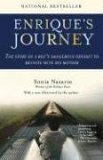Summary | Excerpt | Reading Guide | Reviews | Beyond the Book | Readalikes | Genres & Themes | Author Bio

But Rosa Amalia thinks the separation has caused deep emotional problems. To her, it seems that Belky is struggling with an unavoidable question: How can I be worth anything if my mother left me?
"There are days," Belky tells Aunt Rosa Amalia, "when I wake up and feel so alone." Belky is temperamental. Sometimes she stops talking to everyone. When her mood turns dark, her grandmother warns the other children in the house,
"You better behave, because the seas are choppy!"
Confused by his mother's absence, Enrique turns to his grandmother. Alone now, he and his
father's elderly mother share a shack thirty feet square. Mar'a Marcos built it herself of wooden slats. Enrique can see daylight in the cracks. It has four rooms, three without electricity. There is no running water. Gutters carry rain off the patched tin roof into two barrels. A trickle of cloudy white sewage runs past the front gate. On a well-worn rock nearby,
Enrique's grandmother washes musty used clothing she sells door to door. Next to the rock is the
latrine – a concrete hole. Beside it are buckets for bathing.
The shack is in Carrizal, one of Tegucigalpa's poorest neighborhoods. Sometimes Enrique looks across the rolling hills to the neighborhood where he and his mother lived and where Belky still lives with their
mother's family. They are six miles apart. They hardly ever visit.
Lourdes sends Enrique $50 a month, occasionally $100, sometimes nothing. It is enough for food but not for school clothes, fees, notebooks, or pencils, which are expensive in Honduras. There is never enough for a birthday present. But Grandmother
Mar'a hugs him and wishes him a cheery "Your mom can't send enough," she says,
"so we both have to work."
Enrique loves to climb his grandmother's guayaba tree, but there is no more time for play now. After school, Enrique sells tamales and plastic bags of fruit juice from a bucket hung in the crook of his arm.
Sometimes Enrique takes his wares to a service station where diesel-belching buses rumble into Carrizal. Jostling among mango and avocado vendors, he sells cups of diced fruit.
After he turns ten, he rides buses alone to an outdoor food market. He stuffs tiny bags with nutmeg, curry powder, and paprika, then seals them with hot wax. He pauses at big black gates in front of the market and calls out,
"Who wants spices?" He has no vendor's license, so he keeps moving, darting between wooden carts piled with papayas. Younger children, five and six years old, dot the curbs, thrusting fistfuls of tomatoes and chiles at shoppers. Others offer to carry purchases of fruits and vegetables from stall to stall in
rustic wooden wheelbarrows in exchange for tips.
"Te ayudo? May I help you?" they ask. Arms taut, backs stooped, the boys heave forward, their carts bulging.
In between sales, some of the young market workers sniff glue.
Grandmother Mar'a cooks plantains, spaghetti, and fresh eggs. Now and then, she kills a chicken and prepares it for him. In return, when she is sick, Enrique rubs medicine on her back. He brings water to her in bed. Two or three times a week,
Enrique lugs buckets filled with drinking water, one on each shoulder, from the water truck at the bottom of the hill up to his
grandmother's house.
Every year on Mother's Day, he makes a heart-shaped card at school and presses it into her hand.
"I love you very much, Grandma," he writes.
But she is not his mother. Enrique longs to hear Lourdes's voice. Once he tries to call her collect from a public telephone in his neighborhood. He
can't get the call to go through. His only way of talking to her is at the home of his
mother's cousin Mar'a Edelmira Sanchez Mej'a, one of the few family members who has a telephone. His mother seldom calls. One year she does not call at all.
Excerpted from Enrique's Journey by Sonia Nazario Copyright © 2006 by Sonia Nazario. Excerpted by permission of Random House, a division of Random House, Inc. All rights reserved. No part of this excerpt may be reproduced or reprinted without permission in writing from the publisher.
Your guide toexceptional books
BookBrowse seeks out and recommends the best in contemporary fiction and nonfiction—books that not only engage and entertain but also deepen our understanding of ourselves and the world around us.